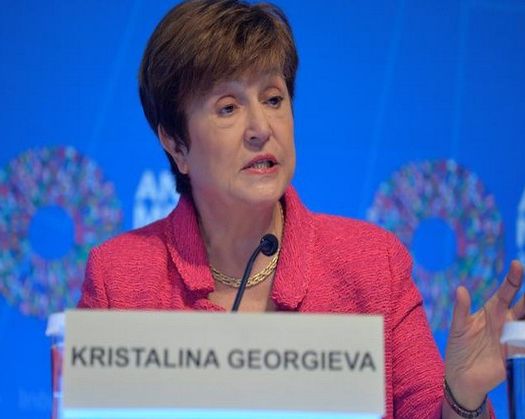Washington, D.C.: In response to U.S. President Donald Trump's declaration of reciprocal tariffs, Kristalina Georgieva, Managing Director of the International Monetary Fund (IMF), voiced her concerns regarding the potential effects on the global economy, stating that these tariffs pose a "significant risk to the global outlook."
Georgieva called on the United States and its trading partners to engage in constructive dialogue to alleviate trade tensions and minimize uncertainty.
In a statement released on Thursday, the IMF quoted Georgieva as saying, "We are currently evaluating the macroeconomic consequences of the announced tariff measures, which undoubtedly present a significant risk to the global outlook amid sluggish growth. It is crucial to avoid actions that could further jeopardize the world economy. We urge the United States and its trading partners to collaborate effectively to resolve trade disputes and lessen uncertainty."
Additionally, Georgieva mentioned that the IMF intends to publish the findings of its assessment in the forthcoming World Economic Outlook.
"We will disclose the results of our evaluation in the World Economic Outlook, which will be released during the IMF/World Bank Spring Meetings later this month," the IMF leader stated.
Following his announcement of global reciprocal tariffs on Wednesday (local time), Trump asserted that the U.S. economy and stock market would experience growth.
During a brief media interaction on Thursday, Trump addressed a question regarding the decline in the stock market following the implementation of tariffs. He stated, "I believe things are progressing very well," and mentioned that the United States is set to receive "six or seven trillion dollars" in revenue.
He went on to assert, "The markets are poised for a boom. Stocks will surge. The nation will thrive -- and other countries are eager to explore potential deals. They have exploited us for many years."
In response to global backlash, Trump proclaimed a national economic emergency and introduced tariffs of at least 10 percent on all nations, with even steeper rates for 60 specific countries.
The tariff strategy includes significant levies on various nations, such as 26 percent on India, 49 percent on Cambodia, 46 percent on Vietnam, 34 percent on China, 24 percent on Japan, and 20 percent on the European Union, according to US media reports, indicating that over 180 countries and regions will be affected by these tariffs.
CNN noted that US stocks experienced a decline in after-hours trading as President Trump spoke in the Rose Garden and announced these extensive tariffs. Market observers are now focused on the Asian indices as they prepare to open for trading.












